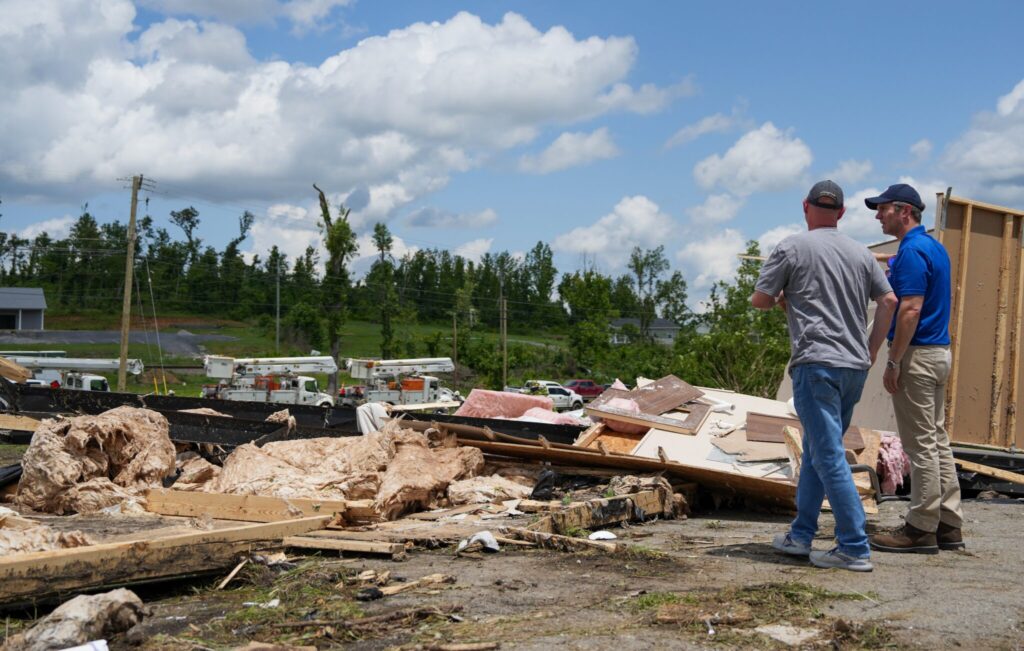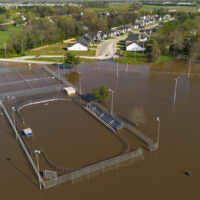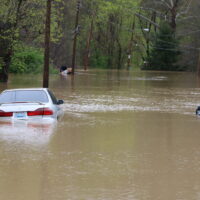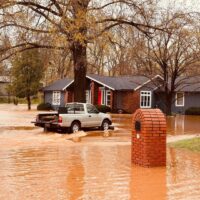The storms that swept through Kentucky over Memorial Day weekend can be triggering and compound trauma for those who have lived through bad weather before, mental health experts say.

Danelle Sams, a therapist and the director of Four Rivers Behavioral Health’s Mayfield Office, the William H. Fuller Center, said many locals in West Kentucky already lived with a “constant, looming fear of another tornado.”
The recent storms, which killed at least five Kentuckians, were difficult for those who lived through the devastating 2021 tornadoes, Sams said.
“Here in Mayfield, we’re still visually seeing the aftermath” of the deadly tornadoes less than three years ago, Sams said. “We still don’t have a courthouse. They just changed the light post and put up the stoplights. For the last couple of years we’ve been working on just stop signs sitting in the road. And so, it’s a slow progression to a new community, but there’s still so many visual reminders of what happened that night.”
So, naturally, she said, people feel anxiety when there are severe weather warnings, especially when they happen at night, like the 2021 twister.
Sunday’s tornado was an EF-3, according to the National Weather Service, with winds of 160 miles per hour. It covered a 700-yard swath of land north of the 2021 path.

This sort of experience leads to “re-exposure,” Sams said, which can cause complex post traumatic stress disorder (PTSD).
Hornet comes in the belly’
“Anytime there is a severe storm threat or potential risk of tornadoes, it’s like the hornet comes in the belly,” Sams said. “And that fear of ‘Oh, no, not again.’”
Marcie Timmerman, the executive director for Kentucky’s chapter of Mental Health of America (MHAKY), said people who didn’t suffer storm damage or lose loved ones can still feel the negative effects of disasters.

“Every time the tornado siren goes off, maybe our stress levels go up just a little bit more,” she said. “Because we know what that could mean, right? And we’ve seen it and we’ve helped our neighbors through it.”
It’s natural to feel amped up and rushes of adrenaline during these times, Timmerman said.
“We’re right in that immediate aftermath. It’s very normal to have a lot of feelings. It’s important to validate your feelings,” she said. “I think it’s important to talk to other people about what you’re going through.”
Tips for processing the storm fallout — and warning signs to watch for
If, in the next few weeks, people aren’t able to get out of bed or work through the grieving process, that’s a sign they may need to seek professional help, Timmerman said.
Cognitive behavioral therapy is a good place to start, she said. Working with a therapist can help a person unlearn the stress reaction that the brain enters after a trauma.
Therapy isn’t meant to “unlearn the trigger” that the body has, she said, but rather to calm it and cope with the emotions of the traumatic event.
People should be on the lookout for a change in their daily routines, Sams said. If, instead of hanging out with friends, a person starts to isolate themselves, that’s a sign that the person needs to seek help.
Other warning signs are:
- Turning to substances or increasing substance use to cope with the stress
- Excessive worry
- Obsession with the weather
Outside of therapy and crisis lines, Sams said, there are techniques people can do to help cope with stress, including:
- Take deep breaths when you feel anxiety.
- Talk to friends and loved ones to let them know how you’re feeling.
This article is republished under a Creative Commons license from Kentucky Lantern, which is part of States Newsroom, a network of news bureaus supported by grants and a coalition of donors as a 501c(3) public charity. Kentucky Lantern maintains editorial independence. Contact Editor Jamie Lucke for questions: info@kentuckylantern.com. Follow Kentucky Lantern on Facebook and Twitter.
Sarah Ladd is a Louisville-based journalist and Kentuckian. She has covered everything from crime to higher education. In 2020, she started reporting on the COVID-19 pandemic and has covered health ever since.






